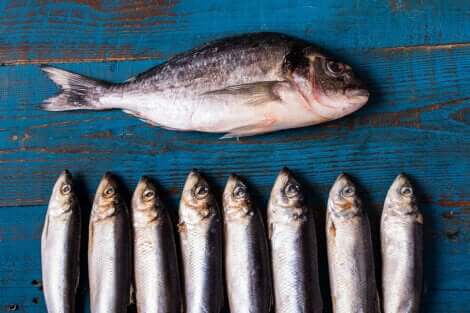Omega 3 fatty acids are able to positively modulate the lipid profile and reduce cardiovascular.
Like other animal products, seafood contains cholesterol in its composition. But that is nothing to worry about.
Until a few years ago, the consumption of cholesterol was limited in the diet because it was thought that it could modify the serum values of the LDL lipoprotein. However, it is now shown that this is not the case.
This is why the current dietary guidelines are much more permissive when it comes to fatty foods. Although they encourage consumption of polyunsaturated fats, with beneficial effects on the lipid profile, they are not as restrictive with saturated fat or foods high in cholesterol.
Cholesterol and cardiovascular disease
The influence of cholesterol on cardiovascular risks is currently being questioned. Indeed, the probabilities of developing atheromatous plaques are related to the oxidation of a small fraction of LDL cholesterol. This is stated in an article published in the journal Current Medicinal Chemistry.
However, modulating the lipid profile may be beneficial in reducing markers associated with metabolic health. However, this does not mean that you should give up dietary cholesterol as such. But rather moderate the ingestion of certain food groups.
Avoid trans fats to modulate cholesterol
When trying to increase HDL cholesterol, which has cardio-protective properties, it is essential to control the ingestion of trans-type lipids in the diet. It is therefore necessary to reduce the consumption of processed, fried, and breaded products.
Moreover, the fact of subjecting vegetable oils to high temperatures favors the genesis of this type of compounds of an inflammatory nature, harmful to health. Indeed, their regular ingestion is linked not only to a deterioration of the lipid profile but also to an increased risk of developing complex pathologies,

Foods that improve the lipid profile
Just as some products can worsen cardiovascular health and lipid profiles, there are other foods that can improve both parameters. An example is omega 3 fatty acids, responsible for reducing systemic inflammation.
This class of nutrients is mainly found in bluefish and dried fruits. Their regular consumption is strongly recommended in order to enjoy a good state of health.
On the other hand, as we mentioned before, the regular consumption of foods rich in antioxidants is essential. These substances are responsible for preventing the oxidation of LDL lipoprotein, which can have a positive impact on health. The red fruit and in particular wild berries like blueberries are rich in antioxidants.

Don't worry too much about dietary cholesterol
Dietary cholesterol is not of great concern when looking to reduce cardiovascular risks. It is not either if the objective is to modulate the lipid profile. Therefore, eggs and seafood are permitted foods as part of a healthy diet.
Under normal conditions, seafood is considered to be healthy. They are also a source of high-quality protein. This characteristic makes them necessary for both sedentary people and sportsmen.
A healthy diet to improve the lipid profile
While the importance of cholesterol in establishing the risk of cardiovascular disease remains uncertain, the lipid profile should be improved as much as possible. For this, it is necessary to guarantee the intake of foods rich in antioxidants, as well as products with an anti-inflammatory nature.
Finally, reducing or limiting the consumption of processed products is a great option. As for fresh foods, they should be the undisputed protagonists of the diet. Seafood, along with other foods from the animal kingdom, can be part of the regular diet. Their cholesterol content will not negatively influence cardiovascular risks.


Post a Comment